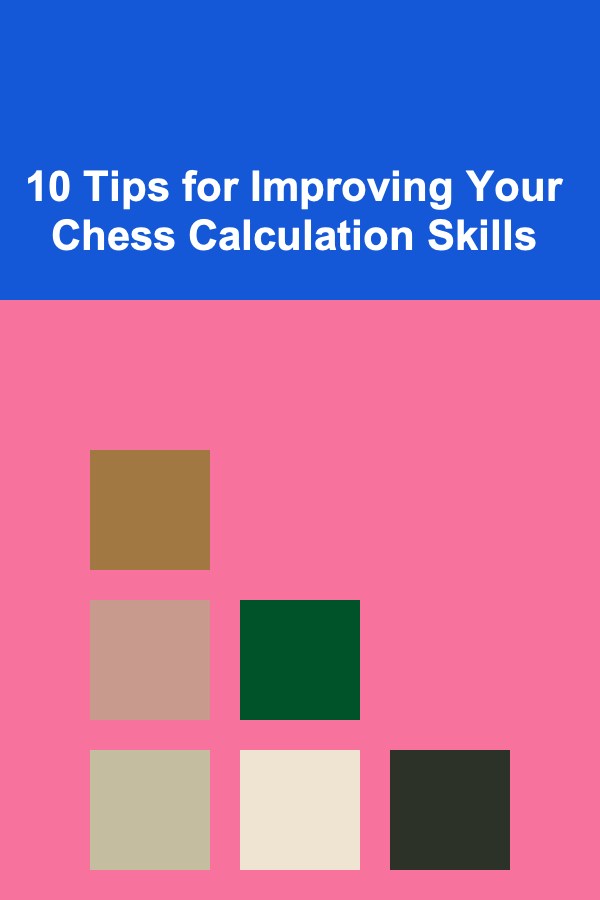
10 Tips for Improving Your Chess Calculation Skills
ebook include PDF & Audio bundle (Micro Guide)
$12.99$8.99
Limited Time Offer! Order within the next:

Chess is a game of strategy, tactics, and foresight. One of the most vital skills that separate strong players from weaker ones is their ability to calculate accurately and efficiently. Calculation, in chess, refers to the process of mentally exploring different sequences of moves to determine the best option. Developing this skill is crucial for advancing in the game, whether you are a beginner, an intermediate player, or even an advanced player. In this article, we will explore ten tips that will help you improve your chess calculation skills.
Understand the Importance of Calculation in Chess
Before diving into specific techniques, it's important to understand why calculation is so critical. In chess, moves are often linked together, and evaluating the consequences of each move accurately is essential for success. Poor calculation can lead to blunders or missed opportunities, while strong calculation can give you an advantage by spotting tactical ideas, identifying threats, and finding the best lines of play.
Calculation is not just about finding a move---it's about understanding the deeper consequences of that move and its impact on the entire game. The better you are at calculating, the more confident you will be in your decisions and the better you will perform in complex positions.
Practice Tactics Regularly
One of the most effective ways to improve your calculation skills is through regular tactical practice. Tactical patterns are the building blocks of calculation, and knowing a wide variety of them can help you recognize these patterns in your games.
How to practice tactics:
- Solve Chess Puzzles : Use puzzle books or online platforms like Chess.com and Lichess to solve tactical puzzles daily. These puzzles typically focus on a specific tactical motif like forks, pins, skewers, discovered attacks, and more.
- Analyze Your Games: Review your games and focus on any tactical oversights or missed opportunities. This will help you spot recurring patterns and avoid making the same mistakes.
- Train with Motifs: Focus on one motif at a time, such as double attacks, to better internalize it and spot it more easily in your games.
Tip:
Tactical calculation is like muscle memory. The more puzzles you solve, the quicker and more accurately you will calculate variations during your games.
Break Down the Position
Before diving into calculation, it is essential to first break down the position. Take a moment to assess all of the key elements---material balance, piece activity, pawn structure, king safety, and so on. Understanding the "big picture" allows you to identify which elements of the position are most critical to your calculation.
Steps for breaking down a position:
- Identify threats: Check if your opponent has any immediate threats, such as attacks on your pieces or a potential tactical sequence.
- Evaluate the strengths and weaknesses: Consider which pieces are well-placed or under threat, and what weaknesses exist in the position (isolated pawns, weak squares, etc.).
- Consider both sides' plans: Think about what your opponent may want to do and how you can either prevent or capitalize on it.
Tip:
By analyzing the position first, you can avoid making hasty moves and instead focus your calculations on the most critical areas of the game.
Visualize Variations in Your Mind
Visualization is a critical skill for improving your calculation. It refers to the ability to mentally "see" the chessboard and imagine different sequences of moves and their outcomes. The stronger your visualization, the deeper and more accurately you will be able to calculate during a game.
How to improve visualization:
- Practice blindfold chess: Play chess without a physical board or pieces to strengthen your visualization abilities. Start with simpler positions and gradually increase the complexity.
- Visualize each move: Instead of just looking at the board, try to mentally picture the pieces moving. This helps you gain a clearer understanding of the position and improves your calculation accuracy.
Tip:
Start with short, simple sequences and gradually work your way up to more complex variations. This progressive training will help build your visualization skills over time.
Consider All Possible Candidate Moves
One of the most important aspects of calculation is considering all possible candidate moves, not just the first idea that comes to mind. Often, a quick first idea might seem attractive, but deeper calculation may reveal that it's not the best option. By systematically evaluating multiple candidate moves, you will improve your ability to find the most accurate and effective move in a given position.
Steps for considering candidate moves:
- Don't settle for the first move: Always consider several different moves and assess their consequences.
- Evaluate forcing moves first: Forcing moves, like checks, captures, and threats, often lead to forced responses from your opponent, making it easier to calculate the resulting positions.
- Examine quiet moves: Sometimes the best move is a quiet one, which may not immediately threaten your opponent but could offer long-term advantages. Make sure to evaluate these moves too.
Tip:
Take your time and consider the full range of moves. This systematic approach will help you avoid missing tactical opportunities.
Calculate Both Short and Long Variations
In chess, calculations can be divided into two main types: short and long variations. Short variations typically involve a few moves and are easier to calculate, while long variations involve more complex lines that require deeper thought.
How to calculate both types of variations:
- Short variations: Look for direct tactics that involve a sequence of captures or checks. These variations are usually easier to calculate because they involve fewer moves.
- Long variations: When calculating longer sequences, try to break the sequence into manageable chunks. After calculating one branch, take a moment to re-evaluate and adjust your calculation based on the new position.
Tip:
Work on both short and long calculations during your training. Short calculations help you spot immediate threats, while long calculations are useful in more complex positions or endgames.
Use the "Blunder Check" Method
Blunders are the result of overlooking important details or failing to fully calculate a position. One way to reduce the risk of blunders is by performing a "blunder check" before making any move. This is a mental process in which you pause and systematically assess the position to make sure you aren't overlooking anything important.
Steps for the "blunder check":
- Double-check key squares: Before making your move, review key squares and important tactical ideas that could influence the position.
- Ask, "What is my opponent threatening?": This simple question can help you spot any immediate threats that could cause you to overlook something important.
- Reassess after every move: After every move, take a moment to check if the situation has changed and whether new tactics are available.
Tip:
By incorporating a "blunder check" into your routine, you will reduce the number of critical mistakes you make during games.
Focus on Calculation Training, Not Just Theory
It is easy to become caught up in opening theory and memorizing variations, but true calculation improvement comes from training your mind to think critically about positions and move sequences. While opening theory is important, make sure to balance it with calculation-focused practice.
How to train calculation:
- Use software and apps : Platforms like ChessBase, Lichess, and Chess.com offer training tools that can help you focus specifically on calculation exercises.
- Work with a coach: A coach can help you identify areas where you struggle with calculation and provide personalized drills to address those weaknesses.
Tip:
Don't just memorize theory---ensure that your training includes exercises focused on calculation and visualization, which will strengthen your overall game.
Stay Calm and Focused During Calculation
It's easy to become overwhelmed when you're calculating a complex position, especially under time pressure. However, staying calm and focused is critical for accurate calculation. Stress can cloud your judgment and cause you to miss key details.
How to stay calm and focused:
- Breathe deeply: Take deep breaths to calm your nerves. This will help you maintain focus and avoid panicking during complex calculations.
- Break down the problem: Instead of focusing on the entire sequence, break it down into smaller, manageable parts.
- Trust your instincts: If you've practiced regularly, your calculation instincts will improve over time. Trust yourself and your training.
Tip:
Stay relaxed and take your time during critical positions. This will help you maintain clarity and prevent mistakes due to panic.
Review and Analyze Your Games
After every game, take the time to review and analyze your moves. Look at the positions where you calculated well and those where you missed something important. Understanding why you made a mistake will help you avoid it in the future and improve your calculation skills.
How to review your games:
- Use a chess engine: Analyze your games with a chess engine like Stockfish or Houdini to spot any inaccuracies or missed tactics.
- Self-analysis: Before using the engine, try to identify the critical moments where you made a mistake. This will help you develop self-awareness and improve your calculation over time.
Tip:
Game analysis is an essential part of improvement. By learning from your mistakes, you can refine your calculation and avoid similar errors in future games.
Conclusion
Improving your chess calculation skills requires dedication, practice, and a systematic approach. By regularly practicing tactics, breaking down positions, visualizing variations, and focusing on both short and long-term calculations, you will gradually enhance your ability to calculate accurately and efficiently. Remember to stay calm, perform a blunder check, and review your games to learn from your mistakes. With consistent effort and a focused approach, your calculation skills will improve, and your overall chess game will reach new heights.
Reading More From Our Other Websites
- [Home Cleaning 101] How to Clean and Maintain Your Home's Baseboards
- [Home Cleaning 101] How to Clean Your Home Without Harmful Chemicals
- [Toy Making Tip 101] Handcrafted Joy: Simple Toy Projects to Gift Your Loved Ones
- [Whitewater Rafting Tip 101] Conquering the Whitewater: A Beginner's Guide to Rafting Rapids
- [Home Maintenance 101] How to Maintain Hardwood Floors to Keep Them Looking New
- [Home Cleaning 101] How to Organize and Clean Your Linen Closet
- [Home Security 101] How to Create a Neighborhood Watch Program for Added Safety
- [Organization Tip 101] How to Create a Stylish Gallery Wall in a Small Home
- [Home Staging 101] How to Leverage Outdoor Spaces with Smart Summer Home Staging Tips
- [Home Renovating 101] How to Incorporate Feng Shui in Your Home Renovation

How to Make Money Online as a Coach: 10 Actionable Ideas
Read More
Monetizing Deep Learning: Creating AI Tools for Ongoing Revenue
Read More
How To Improve Your Positional Play in FPS Games
Read More
Developing Early Writing Skills Through Play: A Comprehensive Guide
Read More
Choosing the Right Spark Plug Socket for Engine Tune-Ups
Read More
How to Plan a Videography Shoot for Real Estate Listings
Read MoreOther Products

How to Make Money Online as a Coach: 10 Actionable Ideas
Read More
Monetizing Deep Learning: Creating AI Tools for Ongoing Revenue
Read More
How To Improve Your Positional Play in FPS Games
Read More
Developing Early Writing Skills Through Play: A Comprehensive Guide
Read More
Choosing the Right Spark Plug Socket for Engine Tune-Ups
Read More